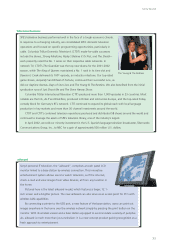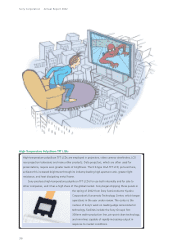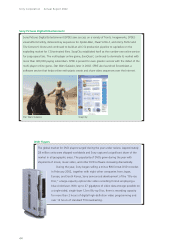Sony 2002 Annual Report Download - page 36
Download and view the complete annual report
Please find page 36 of the 2002 Sony annual report below. You can navigate through the pages in the report by either clicking on the pages listed below, or by using the keyword search tool below to find specific information within the annual report.
34
Sony Corporation Annual Report 2002
IC Cards
Pictured here is the card used in the Suica® service begun by the East Japan Railway Company (JR
East) in the Tokyo metropolitan area from November 2001. Passengers can pass through ticket gates
simply by waving these cards over a reader, even while the card is in its holder. This service uses a
contact-free IC technology known as FeliCa, which was developed by Sony. Sony delivered 6.5
million cards to JR East. In addition to high speed processing and outstanding security, FeliCa cards
are not susceptible to the contact problems that often result from reader/writer wear and soil
because of their contact-free operation. A single FeliCa IC card can be used for a variety of applica-
tions, such as commuter pass, company ID, and electronic money.
In Hong Kong, FeliCa cards, known locally as Octopus Cards, are used in public transpor-
tation and are being put to practical use at convenience stores, vending machines,
and other businesses. As of March 2002, Sony had shipped 12 million of
these cards to Hong Kong, which has a population of 6.85 million. In
April 2002, full-scale rollout of this system began in Singapore, where
Sony has delivered 7 million cards.
http://www.sony.co.jp/en/Products/felica/
Challenges and Strategies in the Music Industry
Worldwide music sales fell 5% in 2001 due to weak economic conditions in a number of major
markets and the growing negative effects of piracy. During the two-year period ending December
31, 2001, the ratio between CDs sold and CDs copied worldwide has shifted from 3:1 to 1:1. The
growth of unauthorized file sharing and CD burning has eroded album sales and hampered the
growth of legitimate online music services.
SMEI is taking aggressive steps to protect its copyrighted works, including pursuing litigation
against copyright infringers, evaluating and implementing technical measures to secure music
content, and working with government agencies to more effectively deal with piracy.
The critical challenge the music industry faces is to establish viable business models and digital
music offerings that are attractive to consumers. Given the conditions the music industry currently
faces, SMEI is not expecting significant growth during the next few years. However, with the
development of legitimate digital music offerings and services attractive to the consumer, and a
ubiquitous distribution network seamlessly connecting secure portable devices, SMEI anticipates that
the negative effects of digital piracy can be offset in the long term.
























